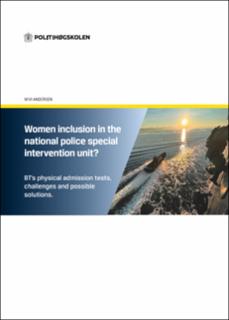Women inclusion in the national police special intervention unit?: BT’s physical admission tests, challenges and possible solutions
Report
Published version
Permanent lenke
https://hdl.handle.net/11250/3107029Utgivelsesdato
2023Metadata
Vis full innførselSamlinger
Sammendrag
The past decade has seen an increased focus on gender balance in the police. By the time this project was initiated in the autumn of 2020 an overall plan for securing a good gender balance in senior police management jobs had been drawn up - in 2016 (Report to the Storting 29 (2019-2020), p. 67). The aim for the period covered by the plan (2017-2020) was for 30 per cent women in senior management police positions and 40 per cent women in total in senior management (Report to the Storting St. 29 (2019-2020), p. 68). The plan envisaged a focus also on police jobs generally in the police, since a good gender balance at ground level was regarded as a prerequisite for recruitment to senior management positions (Police Directorate, 2016, p. 7).
So, to be clear, the overall goal about a good gender balance covers the whole police force (Police Directorate, 2018, p. 28). The reason given is that gender balance is important for the attractiveness of workplaces, and also for the police to be able to attract and retain qualified and experienced staff (Police Directorate, 2018, s.28). The goal has produced tangible results in that the proportion of women in 2017 was 45.6 per cent distributed across all job categories (police, lawyer and civil); an increase of about 1.5 percentage points from 2013. For police jobs the proportion of women was 31.4 per cent in 2017. A contributing factor in this increase is stated to be the PHS recruitment drive towards women (Police Directorate, 2018, p. 28). In 2019 the female proportion of PHS applicants was 52.6 per cent, which at that time was the highest ever.
However, there are big differences in gender balance within the various police positions. In 2019, when the proportion of women at PHS was just over 50 per cent, the patrol services had a female proportion of around 30 per cent, while in the specialist agencies the proportion was around 10 per cent (Gender Diversity Working Group, 10 2020, p. 6). Special agencies are all operational sections that require extension studies and/or specialist courses following graduation from PHS. In addition to the sections under NB, (BT, the Police Bomb squad, the Police Air support unit, the Police Crisis and Hostage Negotiation Unit and, until 2021, the Royal Police Escort (DKP)), the Regional Response Units (UEH), Police Dogs, National Police tactical support unit, Special Operations and incident managers are also part of the special agencies. It is the operational field in particular that is experiencing problems with the recruitment of women. In 2022 a new action plan for police work for the period 2022-2025 was published under the name Diversity, Dialogue and Trust (Police Directorate, 2022). It states that in order to secure gender diversity in leadership roles in the operational service it is also necessary to prioritise the recruitment of women into operational service.
Beskrivelse
The current report is the english version of: Kvinner i Beredskapstroppen (Wivi Andersen) - PHS Forskning 2023: 1
